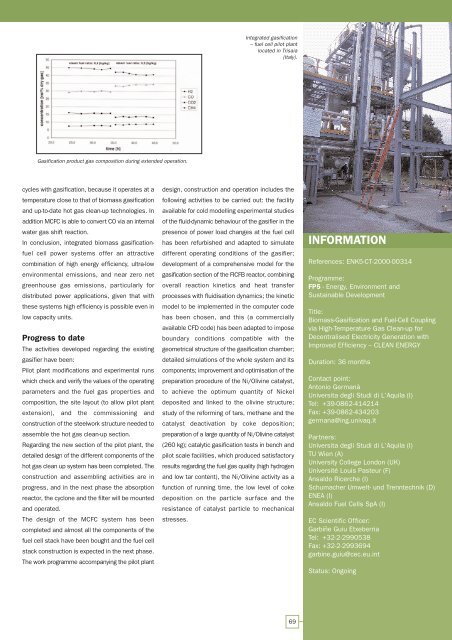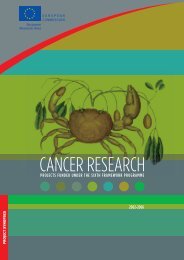European Bio-Energy Projects
European Bio-Energy Projects
European Bio-Energy Projects
Create successful ePaper yourself
Turn your PDF publications into a flip-book with our unique Google optimized e-Paper software.
Gasification product gas composition during extended operation.<br />
cycles with gasification, because it operates at a<br />
temperature close to that of biomass gasification<br />
and up-to-date hot gas clean-up technologies. In<br />
addition MCFC is able to convert CO via an internal<br />
water gas shift reaction.<br />
In conclusion, integrated biomass gasificationfuel<br />
cell power systems offer an attractive<br />
combination of high energy efficiency, ultra-low<br />
environmental emissions, and near zero net<br />
greenhouse gas emissions, particularly for<br />
distributed power applications, given that with<br />
these systems high efficiency is possible even in<br />
low capacity units.<br />
Progress to date<br />
The activities developed regarding the existing<br />
gasifier have been:<br />
Pilot plant modifications and experimental runs<br />
which check and verify the values of the operating<br />
parameters and the fuel gas properties and<br />
composition, the site layout (to allow pilot plant<br />
extension), and the commissioning and<br />
construction of the steelwork structure needed to<br />
assemble the hot gas clean-up section.<br />
Regarding the new section of the pilot plant, the<br />
detailed design of the different components of the<br />
hot gas clean up system has been completed. The<br />
construction and assembling activities are in<br />
progress, and in the next phase the absorption<br />
reactor, the cyclone and the filter will be mounted<br />
and operated.<br />
The design of the MCFC system has been<br />
completed and almost all the components of the<br />
fuel cell stack have been bought and the fuel cell<br />
stack construction is expected in the next phase.<br />
The work programme accompanying the pilot plant<br />
Integrated gasification<br />
– fuel cell pilot plant<br />
located in Trisaia<br />
(Italy).<br />
design, construction and operation includes the<br />
following activities to be carried out: the facility<br />
available for cold modelling experimental studies<br />
of the fluid-dynamic behaviour of the gasifier in the<br />
presence of power load changes at the fuel cell<br />
has been refurbished and adapted to simulate<br />
different operating conditions of the gasifier;<br />
development of a comprehensive model for the<br />
gasification section of the FICFB reactor, combining<br />
overall reaction kinetics and heat transfer<br />
processes with fluidisation dynamics; the kinetic<br />
model to be implemented in the computer code<br />
has been chosen, and this (a commercially<br />
available CFD code) has been adapted to impose<br />
boundary conditions compatible with the<br />
geometrical structure of the gasification chamber;<br />
detailed simulations of the whole system and its<br />
components; improvement and optimisation of the<br />
preparation procedure of the Ni/Olivine catalyst,<br />
to achieve the optimum quantity of Nickel<br />
deposited and linked to the olivine structure;<br />
study of the reforming of tars, methane and the<br />
catalyst deactivation by coke deposition;<br />
preparation of a large quantity of Ni/Olivine catalyst<br />
(260 kg); catalytic gasification tests in bench and<br />
pilot scale facilities, which produced satisfactory<br />
results regarding the fuel gas quality (high hydrogen<br />
and low tar content), the Ni/Olivine activity as a<br />
function of running time, the low level of coke<br />
deposition on the particle surface and the<br />
resistance of catalyst particle to mechanical<br />
stresses.<br />
69<br />
INFORMATION<br />
References: ENK5-CT-2000-00314<br />
Programme:<br />
FP5 - <strong>Energy</strong>, Environment and<br />
Sustainable Development<br />
Title:<br />
<strong>Bio</strong>mass-Gasification and Fuel-Cell Coupling<br />
via High-Temperature Gas Clean-up for<br />
Decentralised Electricity Generation with<br />
Improved Efficiency – CLEAN ENERGY<br />
Duration: 36 months<br />
Contact point:<br />
Antonio Germanà<br />
Universita degli Studi di L’Aquila (I)<br />
Tel: +39-0862-414214<br />
Fax: +39-0862-434203<br />
germana@ing.univaq.it<br />
Partners:<br />
Universita degli Studi di L’Aquila (I)<br />
TU Wien (A)<br />
University College London (UK)<br />
Université Louis Pasteur (F)<br />
Ansaldo Ricerche (I)<br />
Schumacher Umwelt- und Trenntechnik (D)<br />
ENEA (I)<br />
Ansaldo Fuel Cells SpA (I)<br />
EC Scientific Officer:<br />
Garbiñe Guiu Etxeberria<br />
Tel: +32-2-2990538<br />
Fax: +32-2-2993694<br />
garbine.guiu@cec.eu.int<br />
Status: Ongoing

















